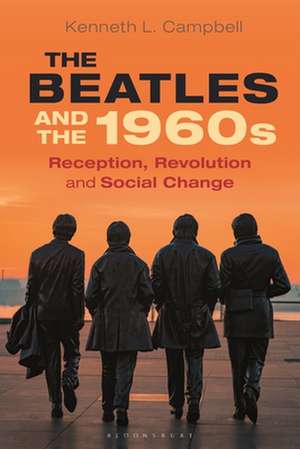The Beatles and the 1960s: Reception, Revolution, and Social Change
Autor Prof. Kenneth L. Campbellen Limba Engleză Paperback – 8 sep 2021
| Toate formatele și edițiile | Preț | Express |
|---|---|---|
| Paperback (1) | 161.76 lei 3-5 săpt. | +31.58 lei 5-11 zile |
| Bloomsbury Publishing – 8 sep 2021 | 161.76 lei 3-5 săpt. | +31.58 lei 5-11 zile |
| Hardback (1) | 468.92 lei 6-8 săpt. | |
| Bloomsbury Publishing – 8 sep 2021 | 468.92 lei 6-8 săpt. |
Preț: 161.76 lei
Preț vechi: 174.65 lei
-7% Nou
Puncte Express: 243
Preț estimativ în valută:
30.96€ • 32.20$ • 25.56£
30.96€ • 32.20$ • 25.56£
Carte disponibilă
Livrare economică 24 martie-07 aprilie
Livrare express 08-14 martie pentru 41.57 lei
Preluare comenzi: 021 569.72.76
Specificații
ISBN-13: 9781350107441
ISBN-10: 1350107441
Pagini: 280
Ilustrații: 20 bw illus
Dimensiuni: 156 x 234 x 25 mm
Greutate: 0.45 kg
Editura: Bloomsbury Publishing
Colecția Bloomsbury Academic
Locul publicării:London, United Kingdom
ISBN-10: 1350107441
Pagini: 280
Ilustrații: 20 bw illus
Dimensiuni: 156 x 234 x 25 mm
Greutate: 0.45 kg
Editura: Bloomsbury Publishing
Colecția Bloomsbury Academic
Locul publicării:London, United Kingdom
Caracteristici
Draws on audience reception theory and untapped primary source materials (primarily student newspapers from the 1960s) to re-evaluate the Beatles' historical significance
Notă biografică
Kenneth L. Campbell is Professor of History at Monmouth University, USA. He is the author of A History of the British Isles: Prehistory to the Present (2017), Ireland's History: From Prehistory to the Present (2013) and Western Civilization: A Global and Comparative Approach, Volumes I & II (2012). He has published and presented work on the Beatles, and has taught a first-year seminar on the Beatles for ten years.
Cuprins
List of Illustrations1. Introduction: The Beatles, the Sixties, and Us2. Post-War Britain, American Rock and Roll, and the Birth of the Beatles3. Post-War Germany, the Beatles, and the Birth of the Sixties4. Profumo, the Pill, and Please, Please Me: The Rise of the Beatles5. 1964: Beatlemania in Historical Context6. 1965: Help! The Beatles and the Culture of the Mid-1960s7. 1966: The Beatles on a Global Stage8. 1967: All You Need is Love - War, Peace, the Beatles, and the Summer of Love9. 1968: Revolution, Rock Music, and the Beatles - The White Album in Historical Context10. 1969: Woodstock, the Beatles, and the End of the Sixties11. Let It Be: Contemporary Responses to the Beatles' Last Albums and the Breakup of the Beatles12. Conclusion: Post-Sixties Politics and the Absence of the BeatlesBibliographyIndex
Recenzii
Author Ken Campbell has given an intriguingly personal, yet historical account ... The Beatles and the 1960s: Reception, Revolution and Social Change (Bloomsbury, 2021) captures what few volumes are able to do: give those details that are already familiar to the devoted and yet place these memories inside a contextual, readable and relatable narrative, not usual for this style of book ... a highly important historical treatise, gathering steam from Kennedy to Kennedy, from Profumo to Paris.
Kenneth L. Campbell's The Beatles and the 1960s: Reception, Revolution, and Social Change explores the Fab Four's extraordinary cultural achievements through a trenchant historical lens. In so doing, Campbell affords readers with a powerful window into the group's reception with each passing masterwork. By tracing the Beatles' artistic growth within the context of key sociocultural shifts during the 1960s, Campbell not only demonstrates the manner in which their work acted as a response to contemporaneous factors, he presciently reveals the ways in which their music continues to resonate into our present day.
Whether you grew up with the Beatles or are discovering them for the first time, The Beatles and the 1960s will give you a fresh understanding of the group's historical context, their reception by critics and fans, the growth of their music and personalities alongside their listeners' lives, and their lasting social and cultural legacies. Guiding us from England to Germany, the U.S. and the world beyond, from Beatlemania through films, stadium tours, godlike personae, psychedelia, and revolutionary experimentation to the most crushing breakup in pop history, Kenneth Campbell offers the reader a new appreciation shaped by both contemporaneous opinion and Brexit-era reconsideration, thereby joining social attitudes across the decades that separate one set of culture wars from another. College-newspaper record reviews, comments by world-shaking recording artists, and dozens of perceptive fan interviews are just some of the newly curated sources that bring the Beatles, their audience and their world to life in this volume.
Kenneth L. Campbell's The Beatles and the 1960s: Reception, Revolution, and Social Change explores the Fab Four's extraordinary cultural achievements through a trenchant historical lens. In so doing, Campbell affords readers with a powerful window into the group's reception with each passing masterwork. By tracing the Beatles' artistic growth within the context of key sociocultural shifts during the 1960s, Campbell not only demonstrates the manner in which their work acted as a response to contemporaneous factors, he presciently reveals the ways in which their music continues to resonate into our present day.
Whether you grew up with the Beatles or are discovering them for the first time, The Beatles and the 1960s will give you a fresh understanding of the group's historical context, their reception by critics and fans, the growth of their music and personalities alongside their listeners' lives, and their lasting social and cultural legacies. Guiding us from England to Germany, the U.S. and the world beyond, from Beatlemania through films, stadium tours, godlike personae, psychedelia, and revolutionary experimentation to the most crushing breakup in pop history, Kenneth Campbell offers the reader a new appreciation shaped by both contemporaneous opinion and Brexit-era reconsideration, thereby joining social attitudes across the decades that separate one set of culture wars from another. College-newspaper record reviews, comments by world-shaking recording artists, and dozens of perceptive fan interviews are just some of the newly curated sources that bring the Beatles, their audience and their world to life in this volume.
